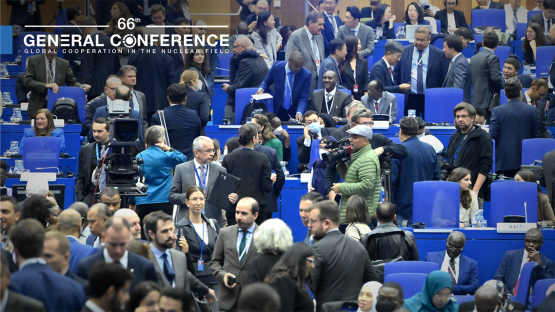The event ReNuAL2: Modernization of the IAEA Seibersdorf Laboratories celebrated recent donations from Belgium, Saudi Arabia and the United States of America to the IAEA’s project, ReNuAL2, for renovating and modernizing its laboratory hub in Austria. Participants learnt that the extrabudgetary funding will support construction of a new building in Seibersdorf that will serve as a new home for the Terrestrial Environment Laboratory, the Plant Breeding and Genetics Laboratory and the Nuclear Science and Instrumentation Laboratory.
The Revealing Secrets Using Nuclear Techniques event explored the many versatile applications of nuclear non-destructive testing techniques in uncovering secrets in various domains, from investigating the composition and origin of historical objects to revealing fraud and verifying the authenticity of paintings, food and timber.
The focus of the Diagnostic Radiology Medical Physicists: Who Are We? event, was the role of clinically qualified medical physicists (CQMPs) in sustaining the safe, quality and effective use of radiation for diagnostic purposes. Panelists at the event discussed the support provided by the IAEA to the medical physics profession, followed by the difference between radiologists and medical physicists and how radiation protection in hospitals has evolved after introducing medical physicists to the field.
At the event Managing Exposure Due to Radionuclides in Food Other than During a Nuclear or Radiological Emergency participants learned about the different approaches to assessing and managing exposures from radionuclides in food during non-emergency situations. The outcomes of a collaborative project initiated in 2017 together the FAO and the WHO was presented to the attendees, including data on the radionuclides routinely present in food.
The Zoonotic Disease Integrated Action (ZODIAC): Current Status and Future Direction event focused on the actions undertaken through the ZODIAC initiative, launched by the IAEA in 2020. The event showcased the progress made over the past two years and how ZODIAC is supporting countries to be better prepared to detect, identify and fight, as early as possible, the ongoing and potential upcoming outbreaks of emerging or re-emerging zoonotic diseases.
At the event State Declarations Portal (SDP): The Efficient Way to Exchange Information with the IAEA Department of Safeguards, participants learned about the portal, which provides an online method for State and regional authorities to submit to, and receive information from, the IAEA’s Department of Safeguards.









